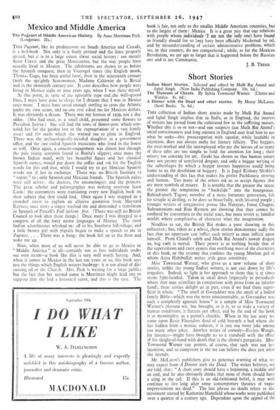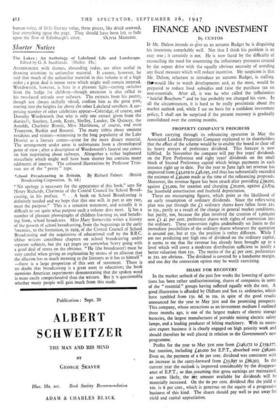Short Stories
Indian Short Stories. Selected and edited by Mulk Raj Anand and Iqbal Singh. (New India Publishing Company. 10s. 6d.) A Dinner with the Dead and other stories. By Moray McLaren. (Serif Books. 7s. 6d.)
THIS collection of Indian short stories made by Mulk Raj Anand and Iqbal Singh implies that in India, as in England, the interest of writers has passed from the cultivated few to the suffering masses. Whether this is so or not—and one suspects that Mulk Raj _Anand's social consciousness and long sojourn in England may lead him to see what he seeks—this preoccupation with squalor, while laudable in intention, does not always make for literary felicity. The beggars, the over-worked and the unemployed who are the heroes of so many of these tales are too simple to hold the attention for long ; their misery too constant for art. Gorki has shown us that human nature does not permit of unrelieved despair, and only a beggar writing of the subterfuges by which a beggar invents happiness could bring home to us the desolation of beggary. It is Jugal Kishore Shnkla's understanding of this fact that makes his porter Pachkaurie moving and human. Too many of the others ask us to accept figures that are mere symbols of misery. It is notable that the greater the talent the greater the temptation to " backslide " into the bourgeoisie. Rabindranath Tagore, member of a more fortunate generation, felt no scruple at dealing, as he does so beautifully, with leisured people ; younger writers of imaginative power like Narayan, Ismat Chugtai, Subramaniam- and Raja Ratnam are showing that they cannot be confined by convention to the social tract, but must revert to familiar worlds where complexities of character whet the imagination.
Needless to say, the British Raj makes a poor showing in this collection ; but, taken as a whole, these stories demonstrate sadly the fact that no oppressor can inflict such misery as man inflicts upon himself. Prem Chand's sahib and Mulk Raj Anand's nawab disgust us, btu each is mortal. Their power is as nothing beside that of the superstitions and caste system that overhang most of the characters in this book, or the tyranny that confines the young Moslem girl of whom Atiya Habibullah writes with great sensitivity.
Miss Townsend Warner, who gives us a new volume of short stories, unlike the young Indian writers, is not cast down by life's tragedies. Indeed, so light is her approach to them that it at times seems light-headed. Taken in small dose's (especially in periodicals where they may scintillate in comparison with prose from an inferior hand), these stories delight us in part, even if we find them super- ficial in whole. " The smell of Gwenddwr was the smell of a boiled family Bible—which was the more unaccountable, as Gwenddwr was such a completely_ agnostic house" is a sample of Miss Townsend Warner's pleasant wit, but brought, as it is, to so wide a variety of human conditions, it flattens out effect, and by the end of the book is as meaningless as a parrot's chuckle. When in the last story we come upon Rosie Flounders dead of cold beneath a bed where she has hidden from a maniac seducer, it is just one more joke among too many other jokes. Another writer of comedy—Evelyn Waugh, for instance—might have brought us to a standstill with the effect- of his sleight-of-hand with death that is the clown's perquisite. Miss Townsend Warner can protest, of course, that such was not her intention, and so competent is she we can believe she does just what she intends.
Mr. McLaren's publishers give us generous warning of what we may expect from A Dinner with the Dead. The writer believes, we are told, that : " A short story should have a beginning, a middle and an end, and he also obviously thinks that most of them should have a sting in the tail. If 'this is an old-fashioned belief, it may well continue to live long after some contemporary theories of vague impressionism are dead." The last phrase no doubt refers to the movement started by Katherine Mansfield whose works were published over a quarter of a century ago. Dependent upon the appeal of the
human voice, of little literary value, these pieces, like dried seaweed, lose everything upon the page. They should have been left to fade



































 Previous page
Previous page